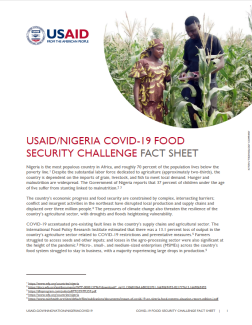Nigeria is the most populous country in Africa, and roughly 70 percent of the population lives below the poverty line.1 Despite the substantial labor force dedicated to agriculture (approximately two-thirds), the country is dependent on the imports of grain, livestock, and fish to meet local demand. Hunger and malnutrition are widespread. The Government of Nigeria reports that 37 percent of children under the age of five suffer from stunting linked to malnutrition.
The country’s economic progress and food security are constrained by complex, intersecting barriers; conflict and insurgent activities in the northeast have disrupted local production and supply chains and displaced over three million people. The pressures of climate change also threaten the resilience of the country’s agricultural sector, with droughts and floods heightening vulnerability.
COVID-19 accentuated pre-existing fault lines in the country’s supply chains and agricultural sector. The International Food Policy Research Institute estimated that there was a 13.1 percent loss of output in the country’s agriculture sector related to COVID-19 restrictions and preventative measures. Farmers struggled to access seeds and other inputs; and losses in the agro-processing sector were also significant at the height of the pandemic. Micro-, small-, and medium-sized enterprises (MSMEs) across the country’s food system struggled to stay in business, with a majority experiencing large drops in production.

